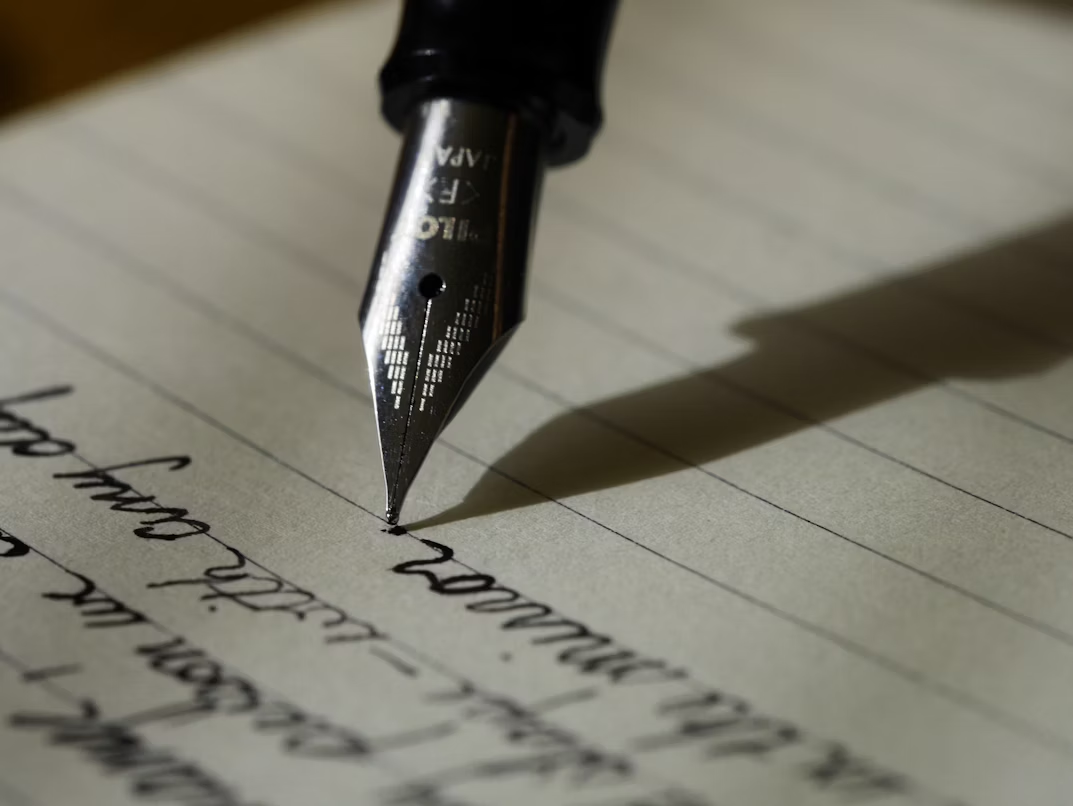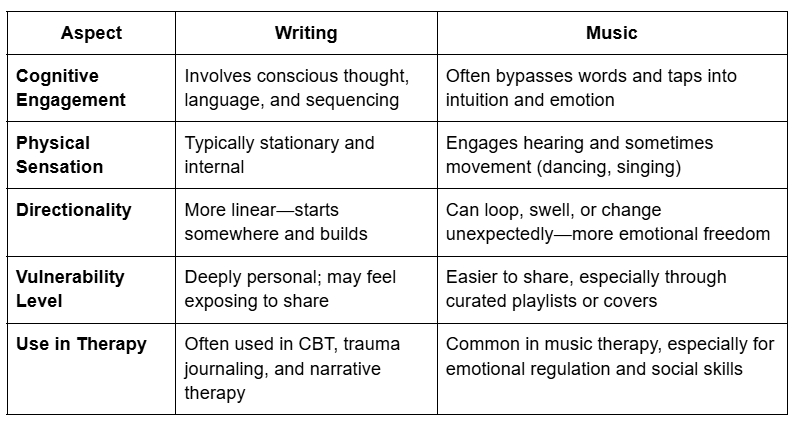When life feels overwhelming, many of us instinctively turn to something creative—music, journaling, poetry, lyrics, playlists, or notebooks filled with raw emotions. While therapy and medication are vital mental health tools, art can also play a meaningful role in healing. For some, it’s the rhythmic safety of a favorite song. For others, it’s the quiet catharsis of writing thoughts down.
In the blog post How Music and Writing Help My Mental Health by a young contributor to YoungMinds, the writer shares how both writing and music provide safe spaces to process emotions. They say: “When I’m feeling anxious, low, or overwhelmed, I use these two things to cope. They both allow me to express how I’m feeling in different ways.”
But how exactly do writing and music affect our mental health? Are they interchangeable? Or do they serve unique purposes? Let’s explore the benefits of each, the overlap between them, and how they differ—so you can better understand which might help you in moments of stress, sadness, or simply self-discovery.
Before comparing writing and music specifically, it helps to understand why creativity supports mental well-being in general.
Research shows that engaging in creative activities helps reduce cortisol (the stress hormone), increase dopamine (the feel-good neurotransmitter), and promote neuroplasticity (your brain’s ability to adapt and heal). Creativity offers:
Now, let’s zoom in and look at writing and music individually.
Writing—whether it’s journaling, poetry, or storytelling—can be a powerful outlet for managing mental health. Here’s why:
Writing helps untangle complicated thoughts. When we put something into words, it becomes more manageable. Journaling about anxiety, depression, or trauma has been shown to lower emotional distress and even improve immune function.
The writer from YoungMinds describes this as “getting everything out of your head.” In their words, “It doesn’t have to make sense, it just has to be there on paper.” This kind of brain-dump writing can release tension and quiet inner chaos.
Writing gives us perspective. It helps us identify patterns in our thoughts or behaviors. Over time, a journal can become a map of your healing, showing growth you might otherwise miss.

When mental health feels overwhelming, writing gives you a sense of authorship over your life. You control the narrative. You decide what’s said, what’s left out, and how it ends.
Writing allows you to say things you might not be ready to voice out loud. Whether it’s grief, rage, confusion, or guilt, the page doesn’t judge. This emotional privacy can be incredibly liberating.
Music offers something equally good for the brain, but it speaks a different language—one that bypasses the intellect and goes straight to the nervous system.
Have you ever felt instantly calmer after a soft piano track? Or more energized after blasting your favorite hype song? Music modulates our nervous system. Upbeat music can pull us out of a funk; slower music can ground us during anxiety.
In the YoungMinds blog, the author says: “Music has this incredible power to alter your mood. Sometimes, I just need something gentle to bring me back down to earth.”
Lyrics can say what we don’t know how to say. Listening to songs that reflect your emotions—whether sadness, anger, or hope—can make you feel seen. “Music has always made me feel less alone,” the blog writer explains. “Even when I couldn’t talk to anyone, I had those lyrics.”

Studies show that music lowers heart rate and blood pressure, especially in stressful situations. It can activate the parasympathetic nervous system (your body’s rest-and-digest mode), which counteracts anxiety.
When depression hits, motivation often disappears. Music can help. It might get you out of bed, through a walk, or even help you clean your room. It provides structure when your brain can’t.
Ultimately, despite their differences, they both revolve around using your creativity in some aspect. While writing and music are different media, they overlap in some meaningful ways:
Both can act as release valves for pressure and pain. You don’t have to be “good” at either to benefit—just honest.
You don’t need permission to write a poem or make a playlist. That sense of freedom is especially powerful if you’re struggling with feeling out of control.
Both tools are relatively low-cost. All you need is a notebook or a free Spotify account. They’re there for you at 2 am, on the bus, during a breakdown.
You can listen to music or create it. You can read others’ writing or write your own. Both offer modes of reflection and engagement.
Lyrics are just another form of writing. Likewise, writing has rhythm and tone. They both help shape your inner world into something visible, something shareable.
Despite their similarities, writing and music activate the brain differently and may help in different situations.

So, which is “better”? Neither. It depends on your needs. If you’re trying to make sense of a situation, writing might help more. If you’re trying to shift your mood or feel less alone, music could be the key.
The most powerful approach might be using both together.
The author of the YoungMinds blog writes songs about their mental health experiences: “I’ll write lyrics down that help me describe how I’m feeling, and it becomes this healing thing I made.” That fusion—writing and music is a deeply healing practice for many.
Writing and music are not substitutes for mental healthcare, but they are companions on the journey. They’re tools you can keep in your pocket—free, flexible, and always available.
If you’re overwhelmed, start small:
Whether you’re scribbling down anxious thoughts or crying to a breakup song, you’re not doing it wrong. You’re surviving. You’re healing. You’re expressing. And that matters.
🎵✍️ Whether you’re a journaler, a singer, a playlist curator, or all three, your voice, your rhythm, and your story matter. Keep writing. Keep listening. Keep healing.
Want to learn more about music therapy? Here’s how music therapy works!